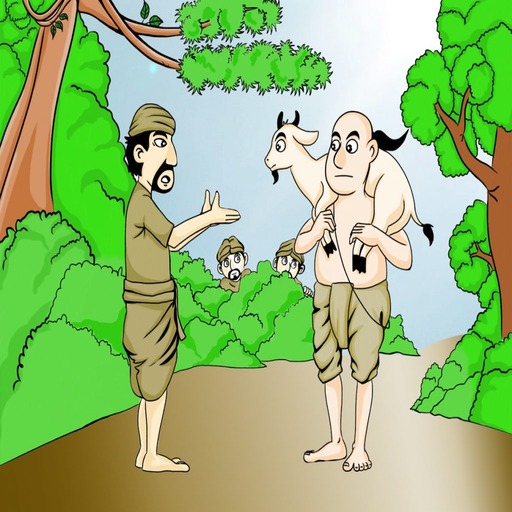
THE STORY OF THE MERCHANT'S SON
In a bustling town lived a merchant named Sagar Dutt. One day, his son purchased a book for a hundred rupees. Curiosity piqued, Sagar Dutt examined the book, discovering just a single verse within its pages:
“The thing which is meant to be received, he definitely gets it. Even the Creator cannot stop the attainment of that thing. That is why I do not feel sad when something is destroyed, nor am I surprised when something is found accidentally. Because what is going to be available to others, we cannot get it and what we are going to get, others cannot get it.”
Enraged by the perceived frivolousness of this purchase, Sagar Dutt confronted his son. “You’ve spent a hundred rupees on a mere verse?” he exclaimed. Displeased with his son’s choice and judgment, he decided to cast him out of their home, proclaiming, “I will no longer keep a fool like you in my house.”
Humiliated and hurt, the Merchant’s son departed, making his way to a distant city. He introduced himself simply by name and came to be known as “Pratavya-arth.” Over time, he started anew, away from the shadow of his father’s anger and disappointment.
In the city, a festive atmosphere enveloped the streets. Princess Chandravati, accompanied by her friend, ventured out to experience the beauty of the festivities. Amidst the revelry, her eyes fell upon a prince from a foreign land. Infatuated, she implored her friend to facilitate a meeting with him.
The princess’s friend approached the prince, relaying her message. “Princess Chandravati is captivated by your presence,” she conveyed. “She wishes to meet you secretly. She’s in a dire state.” The prince, intrigued, asked for details about when and how to reach her. The friend disclosed, “At night, there will be a strong leather rope hanging in her bedroom. You can climb it to reach her room.”
As night descended, the prince hesitated and postponed his rendezvous. Serendipitously, Pratavya-arth, the merchant’s son, was passing by. Observing the rope, he climbed it and entered the princess’s chamber. Mistaking him for the prince, Chandravati welcomed him warmly, treating him with sumptuous fare and sharing her bed.
Amidst their interaction, Pratavya-arth remained silent. Puzzled, Chandravati prodded him to speak. “Why do you remain silent?” she inquired. Pratavya-arth responded enigmatically, “Man gets what he has achieved.” Intrigued yet skeptical, Chandravati requested him to leave.
Pratavya-arth retreated to an old temple for shelter. Coincidentally, the city guard, too, visited the temple to meet his beloved. Mistaking Pratavya-arth for someone else, the guard offered him a place to rest, but due to insomnia, he ended up elsewhere.
Vinayvati, the guard’s daughter, had also found love’s embrace. She signaled her lover to meet her at the same location where Pratavya-arth had found refuge. Recognizing him, Vinayvati welcomed her lover’s arrival. Sharing her bed, she questioned his silence, to which Pratavya-arth once again repeated his cryptic phrase, “Man gets what he has achieved.” Realizing her hasty actions, Vinayvati guided him out.
Continuing his journey, Pratavya-arth encountered a grand procession led by a groom named Varakirti. Joining the procession, he arrived at the wedding venue, where the bride, Seth’s daughter, awaited her groom. However, chaos ensued when a rampaging elephant disrupted the ceremony. In the ensuing commotion, Varakirti and the other grooms fled, leaving the bride stranded.
Amidst the turmoil, Pratavya-arth stood his ground, comforting the frightened bride. He confronted the elephant, using a stick to drive it away. Witnessing his bravery, Varakirti returned, only to find his bride alongside Pratavya-arth. Accusations arose, but Seth’s daughter declared her intention to marry Pratavya-arth due to his heroism.
Confounded by the situation, the king sought clarification from everyone involved. Pratavya-arth’s cryptic responses to the king’s queries left everyone bewildered. It was then that the true meaning behind those phrases became evident: “Man attains only his achievable meaning,” “Even the creator cannot stop him,” and “Therefore I do not repent of the past, and I am not surprised by it.” Each person’s actions had led them to their destined outcomes.
Impressed by Pratavya-arth’s wisdom and character, the king bestowed upon him the title of crown prince, along with his daughter’s hand in marriage and vast riches. Similarly, the guard’s daughter, Vinayvati, also wed Pratavya-arth. With his family joining him, Pratavya-arth’s life transformed from a discarded son to a revered prince, surrounded by love and respect.
The tale of Pratavya-arth demonstrates that destiny plays a significant role in our lives, guiding us towards our predetermined attainments. The lessons learned from his journey echo the verse from the book he had purchased: “The name of the eater is written on each of the grain.” Each individual’s path is uniquely scripted, and what is meant to be received, will be received.







